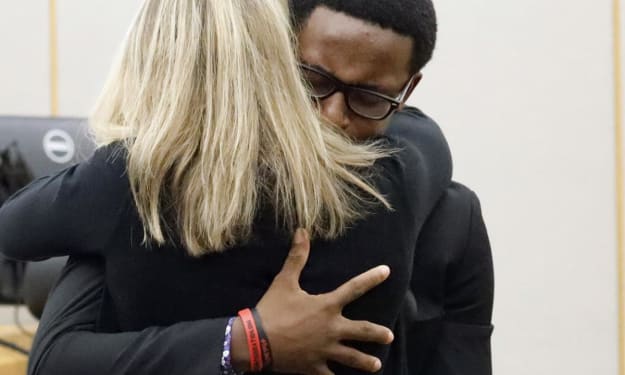'Joker's' Wave of Madness
Review on the film: plot, themes, and Phoenix's performance.

Dear Readers.
I believe you all had seen Joker by now. And even if you haven’t, shame on you. I hope this is enough of an incentive to see the film. The entire film, I meant. Since I’ve heard people were walking out of the theater without finishing it. You are all better than that. And without any further ado, spoilers ahead, of course.
As you may have guessed it, Joker serves as a backstory platform for the DCU’s favorite killer clown. Taking place in 1981, in a crime-infested Gotham City, the film tells the story of Arthur Fleck, a party clown who lives taking care of his soon-to-be-revealed mentally ill mother, Penny. He suffers of a disorder that provokes him to laugh at inappropriate times and relies on a therapist to receive medication. Things only get worse for him: he gets jumped by a gang, gets fired from his job after his co-worker’s gun falls off him, and funding cuts leave him without his therapist and medication. He did end up dating Sophie, which was the highlight of his life. However, out of all the climaxes in the film, seeing Arthur murder the three men on the subway was the most satisfying one.
The first two? Self-defense. The third one was executed; three bullets to the back. All fired regardless the hesitation. A part of me believes Arthur knew what he did; I want to believe Arthur’s understanding of the action is what inspired Joaquin Phoenix to have Fleck proceed with hesitation. Arthur says, “The worst part of having a mental illness is people expect you to behave as if you don't.” While in clown makeup, Arthur was not Arthur. He was a clown that had to disassociate from his body, so he behaved as if it wasn’t him even though he knew what he was doing. That’s why he doesn’t confess to the crimes right away; it is only while on Murray that he confesses to what he did in full Joker attire before he murders him on live TV.
Nevertheless, those actions do inspire two factors. One, he inspires a series of violent riots between the poor and the filthy rich. Two, he reminds us that untreated mental illness has the potential of inciting someone to commit violence. Specially against the people they perceive as bullies. According to the media itself, this is a troubling common denominator found in white men who become suspects and execute brutal mass crimes. Arthur did this with the three businessmen (who assaulted him), his co-worker Randall (who lied about the gun to save his own behind), his mother Penny (who lied to him and allowed him to be a victim of child abuse) and Murray (who humiliated him prior to inviting him on the show).
It gets darker when the viewer realizes that most of this takes place inside Arthur’s mind. We know what he is doing and why he thinks it’s right. But we don’t really understand to the full extent the point of view of those around him, except for one instance. He breaks into Sophie’s apartment just for us to discover that Arthur and her never actually dated; it was just another one of his narcissistic delusions, like the one where he thought his comedy gig went well. And the one where Sophie (or fake Sophie) tells Arthur that his alter ego is a hero. Todd Phillips does this by showing us previous scenes that detailed Sophie’s genuine absence in Arthur’s one-sided relationship; it was genius. This might be in fact the one thing that he had in common with his mother; despite him being adopted, she seriously thought that Thomas Wayne was his father as a result of her own mental illness and narcissistic disorder. Which brings me to the plot hole part of this review.
If you watch the film, you will come to realize that, due to the pictures of young Arthur, he was probably around five years old when his mom’s then-boyfriend abused him. How is it that he doesn’t remember it? My boyfriend and I chose to believe that he repressed the memory. But that doesn’t explain his life after that, and why/how his mother didn’t lose custody of him. Nevertheless, a part of me saw the abuse story coming since I’ve read somewhere that Phoenix lost 52 pounds to get ready for the part. Nice touch, by the way, Sir. Second, why would Thomas Wayne take his family out to the theater when there are people killing each other on the streets? I mean, we know what happens to him and Martha in the alley with Bruce. It still doesn’t make sense why one of Gotham’s elite would deliberately put his family in danger. Third, did he kill the psychiatrist or not? He does leave a trail of bloody footprints while making a run for it.
My final thoughts are on Phoenix’s performance of Arthur/Joker. It was terrifying in the best way possible. Even when he wasn't speaking, there was no way to tell what Arthur was going to do next. The beginning of the movie alone was chilling: Arthur putting on make up while staring himself in the mirror, a blank stare from Phoenix. He was going through the motions; Fleck was controlling himself back when he knew he had to. No emotion, just paint running down his face. And then there were these dancing scenes. In both occasions, he held a different kind of control. In the first dancing scene, he rushes to the closest bathroom he can find after murdering the three men. And whatever the reason, his panic leads to dancing. And it is through this dancing that he learns of this darker entity inside him; he embraces it and, after relieving himself, the Joker is born. The second dancing scene takes place in the rain-covered stairs that he abhorred taking as part of his commute. This is the one that broke the internet with memes before the movie was even released. With the help of the OG Spiderman. Arthur isn’t releasing himself in these stairs. He is murdering himself and replacing Fleck with Joker in what seems like a happy, and thrilling, epiphany. After all, he wasn’t sure if he even existed. Now he does. Now, if you excuse me, I am going to watch this movie again. You should too.
Until next time,
AO
About the Creator
Argenis Ovalles
Started writing when I was 18. Ever since then I couldn't stop. Check out my story, "Mad," on Wattpad at https://my.w.tt/cfqHb0tkPW






Comments
There are no comments for this story
Be the first to respond and start the conversation.